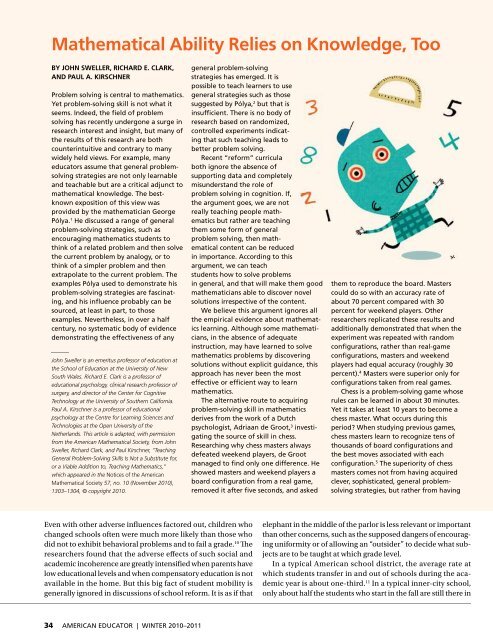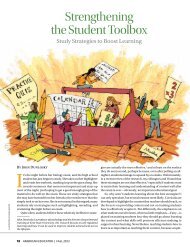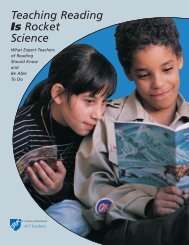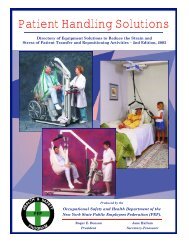American Educator, Winter 2010-11, Vol. 34, No. 4, AFT
American Educator, Winter 2010-11, Vol. 34, No. 4, AFT
American Educator, Winter 2010-11, Vol. 34, No. 4, AFT
You also want an ePaper? Increase the reach of your titles
YUMPU automatically turns print PDFs into web optimized ePapers that Google loves.
Mathematical Ability Relies on Knowledge, Too<br />
By JOHN SWELLER, RICHARD E. CLARK,<br />
AND PAUL A. KIRSCHNER<br />
Problem solving is central to mathematics.<br />
Yet problem-solving skill is not what it<br />
seems. Indeed, the fi eld of problem<br />
solving has recently undergone a surge in<br />
research interest and insight, but many of<br />
the results of this research are both<br />
counterintuitive and contrary to many<br />
widely held views. For example, many<br />
educators assume that general problemsolving<br />
strategies are not only learnable<br />
and teachable but are a critical adjunct to<br />
mathematical knowledge. The bestknown<br />
exposition of this view was<br />
provided by the mathematician George<br />
Pólya. 1 He discussed a range of general<br />
problem-solving strategies, such as<br />
encouraging mathematics students to<br />
think of a related problem and then solve<br />
the current problem by analogy, or to<br />
think of a simpler problem and then<br />
extrapolate to the current problem. The<br />
examples Pólya used to demonstrate his<br />
problem-solving strategies are fascinating,<br />
and his infl uence probably can be<br />
sourced, at least in part, to those<br />
examples. Nevertheless, in over a half<br />
century, no systematic body of evidence<br />
demonstrating the effectiveness of any<br />
John Sweller is an emeritus professor of education at<br />
the School of Education at the University of New<br />
South Wales. Richard E. Clark is a professor of<br />
educational psychology, clinical research professor of<br />
surgery, and director of the Center for Cognitive<br />
Technology at the University of Southern California.<br />
Paul A. Kirschner is a professor of educational<br />
psychology at the Centre for Learning Sciences and<br />
Technologies at the Open University of the<br />
Netherlands. This article is adapted, with permission<br />
from the <strong>American</strong> Mathematical Society, from John<br />
Sweller, Richard Clark, and Paul Kirschner, “Teaching<br />
General Problem-Solving Skills Is <strong>No</strong>t a Substitute for,<br />
or a Viable Addition to, Teaching Mathematics,”<br />
which appeared in the <strong>No</strong>tices of the <strong>American</strong><br />
Mathematical Society 57, no. 10 (<strong>No</strong>vember <strong>2010</strong>),<br />
1303–1304, © copyright <strong>2010</strong>.<br />
<strong>34</strong> AMERICAN EDUCATOR | WINTER <strong>2010</strong>–20<strong>11</strong><br />
general problem-solving<br />
strategies has emerged. It is<br />
possible to teach learners to use<br />
general strategies such as those<br />
suggested by Pólya, 2 but that is<br />
insuffi cient. There is no body of<br />
research based on randomized,<br />
controlled experiments indicating<br />
that such teaching leads to<br />
better problem solving.<br />
Recent “reform” curricula<br />
both ignore the absence of<br />
supporting data and completely<br />
misunderstand the role of<br />
problem solving in cognition. If,<br />
the argument goes, we are not<br />
really teaching people mathematics<br />
but rather are teaching<br />
them some form of general<br />
problem solving, then mathematical<br />
content can be reduced<br />
in importance. According to this<br />
argument, we can teach<br />
students how to solve problems<br />
in general, and that will make them good<br />
mathematicians able to discover novel<br />
solutions irrespective of the content.<br />
We believe this argument ignores all<br />
the empirical evidence about mathematics<br />
learning. Although some mathematicians,<br />
in the absence of adequate<br />
instruction, may have learned to solve<br />
mathematics problems by discovering<br />
solutions without explicit guidance, this<br />
approach has never been the most<br />
effective or effi cient way to learn<br />
mathematics.<br />
The alternative route to acquiring<br />
problem-solving skill in mathematics<br />
derives from the work of a Dutch<br />
psychologist, Adriaan de Groot, 3 investigating<br />
the source of skill in chess.<br />
Researching why chess masters always<br />
defeated weekend players, de Groot<br />
managed to fi nd only one difference. He<br />
showed masters and weekend players a<br />
board confi guration from a real game,<br />
removed it after fi ve seconds, and asked<br />
them to reproduce the board. Masters<br />
could do so with an accuracy rate of<br />
about 70 percent compared with 30<br />
percent for weekend players. Other<br />
researchers replicated these results and<br />
additionally demonstrated that when the<br />
experiment was repeated with random<br />
confi gurations, rather than real-game<br />
confi gurations, masters and weekend<br />
players had equal accuracy (roughly 30<br />
percent). 4 Masters were superior only for<br />
confi gurations taken from real games.<br />
Chess is a problem-solving game whose<br />
rules can be learned in about 30 minutes.<br />
Yet it takes at least 10 years to become a<br />
chess master. What occurs during this<br />
period? When studying previous games,<br />
chess masters learn to recognize tens of<br />
thousands of board confi gurations and<br />
the best moves associated with each<br />
confi guration. 5 The superiority of chess<br />
masters comes not from having acquired<br />
clever, sophisticated, general problemsolving<br />
strategies, but rather from having<br />
Even with other adverse infl uences factored out, children who<br />
changed schools often were much more likely than those who<br />
did not to exhibit behavioral problems and to fail a grade. 10 elephant in the middle of the parlor is less relevant or important<br />
than other concerns, such as the supposed dangers of encourag-<br />
Th e ing uniformity or of allowing an “outsider” to decide what sub-<br />
researchers found that the adverse eff ects of such social and<br />
academic incoherence are greatly intensifi ed when parents have<br />
low educational levels and when compensatory education is not<br />
available in the home. But this big fact of student mobility is<br />
generally ignored in discussions of school reform. It is as if that<br />
jects are to be taught at which grade level.<br />
In a typical <strong>American</strong> school district, the average rate at<br />
which students transfer in and out of schools during the academic<br />
year is about one-third. <strong>11</strong> In a typical inner-city school,<br />
only about half the students who start in the fall are still there in





